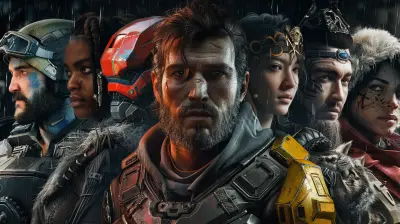How Developers Use FOMO to Increase In-Game Purchase Sales
12 June 2025
Have you ever been playing a game and found yourself absolutely dying to snag that limited-edition skin or rare item before it disappears forever? That, my friend, is no accident. Welcome to the world of FOMO (Fear of Missing Out) — a psychological tactic that game developers have mastered to encourage players like you and me to make in-game purchases. It’s sneaky, it’s smart, and if we’re being honest, it works really well.
Let’s dive into the nitty-gritty of how developers use FOMO to keep us reaching for our wallets and unlocking those shiny virtual goodies.
What Is FOMO and Why Does It Work?
FOMO, or the Fear of Missing Out, is that uncomfortable feeling you get when you think you’re being left out of something cool, rare, or special. It’s not just a gaming thing — it happens in social media, too. Ever scrolled through Instagram and seen your friends at a party you weren’t invited to? Yeah, that’s FOMO right there.Game developers tap into this psychological phenomenon to influence our behaviors. They use clever tricks to make players feel like they'll regret not acting immediately. And because humans are wired to hate missing out, we tend to cave under pressure.
How FOMO Plays Out in Gaming
When it comes to gaming, FOMO can show up in various forms. Here are a few examples of how developers use it to boost in-game purchase sales:1. Limited-Time Offers
Picture this: you’re midway through a game, and a popup suddenly appears — "Grab the Legendary Sword of Awesome Power for 50% off! Offer ends in 24 hours!" There’s a countdown timer ticking away, and you can almost feel the pressure mounting. What if you skip it and never get another chance to own it?
Timed events and limited sales are classic FOMO triggers. Developers intentionally give these offers an expiration date to create urgency. If something’s only available for a short period, players are far more likely to purchase it in the heat of the moment.
2. Exclusive Content
Nobody likes being left out, especially when it comes to exclusive items that scream, "Look at me! I’m special!" Developers know this, so they create content that’s only available to paying players. Whether it’s a rare skin, an ultra-unique weapon, or a special mount, these items make paying customers feel like part of an elite club. And let’s face it — peer pressure is real, even in gaming. If your friends all have a cool rare costume that you don’t, you’ll probably feel the urge to buy it just to keep up. It’s like being the only kid in school without the latest sneakers.
3. Battle Passes and Seasonal Rewards
Do you know those battle passes and seasonal events that seem to have taken over almost every multiplayer game? They’re built for FOMO. Here’s how they work: - Players buy a battle pass that grants access to exclusive rewards (skins, emotes, etc.).
- The catch is, you have to unlock those rewards by playing the game within a specific timeframe.
- Miss out? Tough luck — those rewards won’t come back.
This constant cycle keeps players engaged (and spending), as they don’t want to miss their shot at grabbing all the goodies available in a season.
4. Countdown Timers Everywhere
Ever noticed how countdown timers are literally everywhere in modern games? Whether it’s a daily login bonus, a flash sale in the shop, or a limited-time event, developers slap timers on everything to make players feel like time is running out. Timers are incredibly effective because they tap into our natural fear of scarcity. Humans are wired to want things more if they think they might lose the chance to get them. So when you see a timer ticking down, your brain goes, "I need this right now!"
5. Social Proof and Achievements
Multiplayer games have a unique way of amplifying FOMO through social dynamics. When players see others flaunting rare items, cool skins, or exclusive titles, it triggers a sense of envy. You start thinking, "If they can have it, why can’t I?"Developers make this worse (or better, depending on your perspective) by publicly showcasing these rare achievements. Whether it’s through leaderboards, guilds, or even just showing off in the chat, it feeds into players’ desire to not feel left out.
Think of it like a digital high school lunchroom. Everyone’s showing off their shiny collectibles, and you really don’t want to be the one with the boring tray.
Why FOMO Is a Double-Edged Sword
Here’s the thing about FOMO: while it’s wildly effective, it’s also a bit of a slippery slope. On one hand, it keeps games exciting and gives players something to chase after. On the other hand, it can lead to feelings of frustration and even burnout if players feel like they’re constantly missing out.For players, it’s important to recognize these tactics for what they are. Once you understand how FOMO works, you can make more mindful choices about what’s worth spending your money (and time) on.
How Players Can Outsmart FOMO
Let’s flip the script for a minute. Knowing how developers use FOMO can actually help you resist it. Here are a few tips:1. Ask Yourself, “Do I Really Need This?”
If a purchase feels rushed or impulsive, pause for a second. Is that rare skin or limited-time bundle really going to improve your experience, or is it just shiny bait?
2. Set a Budget
Decide in advance how much you’re willing to spend on in-game purchases each month. This way, you can enjoy the game without accidentally blowing your savings.
3. Accept That You’ll Miss Out Sometimes
And that’s okay! No one has everything, and skipping one or two events won’t ruin your gaming experience.
4. Play for Fun, Not for Status
Remember why you started gaming in the first place: to have fun. Don’t let FOMO turn it into a stressful, never-ending quest for digital swag.
The Bottom Line
Game developers are masters at using FOMO to keep players hooked and spending. From limited-time offers to exclusive content, they know just how to spark that "I need this now" feeling. And you know what? That’s not necessarily a bad thing — as long as you’re aware of what’s happening and make your purchases intentionally (not out of panic).Remember, gaming is supposed to be fun, not a constant hustle to keep up. So the next time you feel the FOMO creeping in, take a deep breath, and ask yourself: "Is this really worth it?
all images in this post were generated using AI tools
Category:
In Game PurchasesAuthor:

Lana Johnson
Discussion
rate this article
2 comments
Morrow McVeigh
Great read! FOMO is such an interesting tactic in the gaming world. It's fascinating how developers create urgency and excitement around in-game purchases. Can't wait to see how this strategy evolves in future titles. Keep up the fantastic work with these insightful articles!
October 28, 2025 at 4:57 AM

Lana Johnson
Thank you for the kind words! I’m glad you found the article insightful. FOMO is definitely a captivating strategy, and I’m excited to see how it continues to evolve in gaming!
Marcus McCall
Insightful take on FOMO’s impact on game sales!
June 24, 2025 at 3:33 AM

Lana Johnson
Thank you! I'm glad you found it insightful. FOMO can really drive engagement and sales in gaming!


